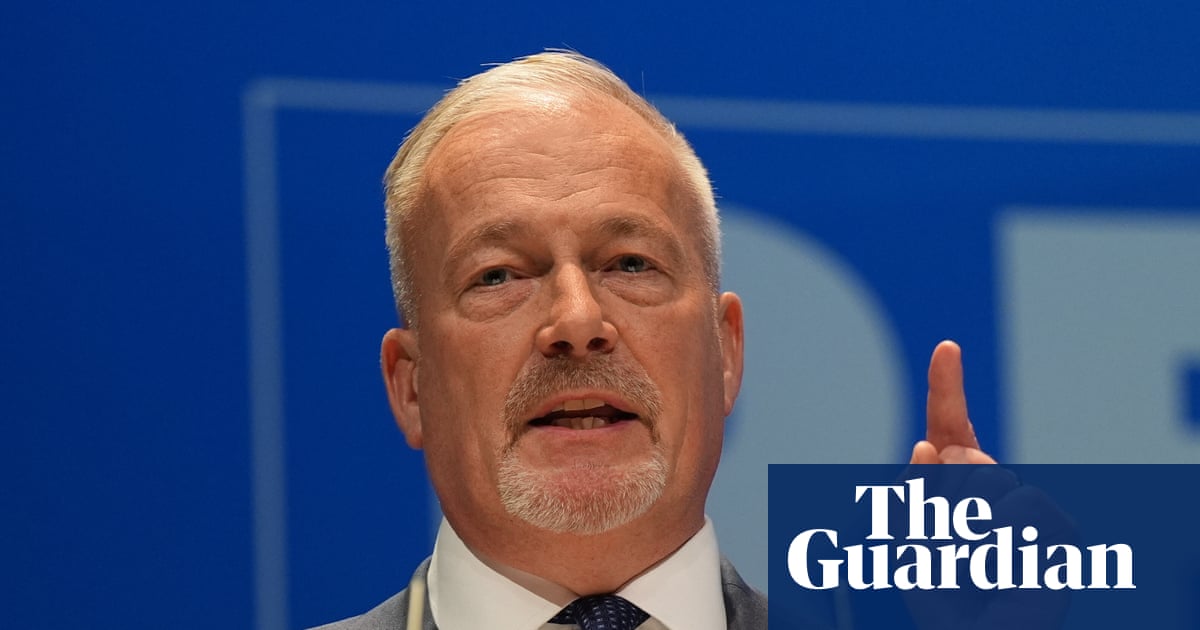
A government watchdog advised a former minister that he could work with a subsidiary of a company linked to Chinese surveillance technology, the Guardian can reveal.
Richard Fuller, who served as economic secretary to the Treasury in the governments of Boris Johnson and Liz Truss, wrote to the Advisory Committee on Business Appointments (Acoba) before joining Investcorp Securities as an advisory board member in 2023.
Fuller, 63, is now shadow chief secretary to the Treasury and is due to speak at several events at the Conservative party’s annual conference, which opens in Manchester on Sunday.
He has worked for Investcorp Securities for more than two years, including when he was interim chair of the Conservative party in 2024.
Investcorp Securities is a UK subsidiary of the Bahrain-based private equity firm Investcorp International. The parent company has provided financial backing to several controversial Chinese technology firms including Sense Time, a pioneering facial recognition startup.
In 2018, Investcorp International announced its “debut” investment in China, pledging up to $150m (£112m) to the China Everbright new economy fund. The fund was designed to support the Chinese technology sector and promised “huge opportunities” for investors in the advent of AI. The China Everbright Group is an asset manager that is ultimately controlled by the Chinese government.
One beneficiary was Sense Time, whose surveillance technology is used by the Chinese police. Investcorp International is understood to retain a small financial stake in the company.
Human rights groups have accused China of carrying out mass surveillance on the Uyghur population in its northwestern Xinjiang province. More than a million Uyghurs are believed to have been detained in a large network of “re-education” camps. In 2019, Sense Time filed a patent for a facial recognition device that it said had the ability to pick Uyghur Muslims out of a crowd.
Although the company denied that the technology was used to discriminate against Uyghurs, the US imposed sanctions on Sense Time in 2021. The Biden administration said it was banning American investment in the firm because it was developing programmes that could “determine a target’s ethnicity, with a particular focus on identifying Uyghurs”.
Earlier that year, British MPs voted to declare that the Chinese government was committing genocide against the Uyghur population, although Nigel Adams, the then Asia minister, said the government’s position was that it was a matter for the courts to determine. Beijing condemned the declaration and said MPs had “cooked up” the motion to discredit China.
Fuller, the MP for North Bedfordshire, has held several roles at Investcorp Securities, some pre-dating his first election to parliament in 2010. However, he was only expected to consult Acoba when he wanted to rejoin the firm after leaving government.
His current post earns him £25,000 a year on top of his parliamentary salary, according to the public register of MPs’ financial interests.
Fuller said in a statement: “I returned as an adviser to the venture capital business in April 2023 following approval from the Advisory Committee on Business Appointments. This was included in my register of interests in the usual way.
“The venture capital group I advise is part of a much wider group, Investcorp. The funds I advise are solely focused on investments in European technology businesses.
“At no time have I played any role at, or had any dealings with, either the China Everbright new economy fund or their portfolio company Sense Time.”
Acoba is being wound down and will be disbanded this month after criticisms that it is “toothless”. Its functions will be transferred to a range of other government regulators.
It is understood Acoba was not normally tasked with investigating the wider business activities of companies for which former ministers planned to work. It was supposed to consider whether a post-ministerial appointment could give rise to “public concern”.
Acoba’s response to Fuller did not mention the Investcorp group’s documented links to Sense Time or suggest it had considered this when advising on the appointment.
Its letter acknowledged a “risk” that Fuller’s “network and influence” could be used to assist Investcorp Securities unfairly. It added that in his government role Fuller may have had “access to general sensitive information which could benefit a range of organisations”.
However, it said that these risks could be appropriately mitigated by a range of factors, including the fact Fuller’s time in the Treasury was brief. It noted that Fuller had not met with Investcorp Securities while in government. It advised Fuller he could take up the post on the condition that he did not use privileged information he had accessed or lobby the government on the company’s behalf for two years.
A government spokesperson said: “We are committed to establishing the right structures to uphold the highest standards in public life. In July we announced a series of reforms, including forthcoming changes to the business appointments system.”
A Sense Time spokesperson said the company “strongly opposes the unfounded designations and accusations made against it” by the US government and “regrets being caught in the midst of the geopolitical landscape”.
The Investcorp group declined to comment.


